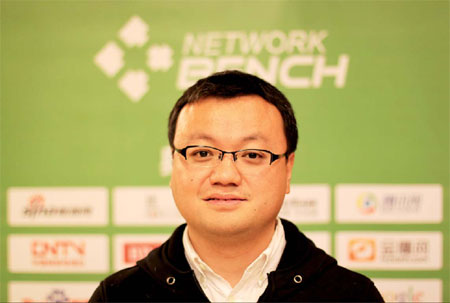Spinning a wider web
Updated: 2013-02-01 09:14
By Su Zhou and Chen Yingqun (China Daily)
|
|||||||||||
|
Pu Wei is president of NetworkBench Systems Corp, which is preparing to enter the North American and European markets. Provided to China Daily |
For NetworkBench, increasing the scope of its operations and tailoring services for its clients go hand in hand
After seizing a large share of the market from its overseas counterparts in China, Pu Wei and his company NetworkBench Systems Corp are preparing to compete in the North American and European markets this year.
The company, established in Beijing in March 2007, is following in the footsteps of US companies Keynote Systems Inc and Compuware Gomez. NetworkBench helps clients to know precisely how their websites, content and applications perform on actual browsers, networks and mobile devices, so they can improve their websites accordingly.
"We've outperformed Keynote and Gomez in China, and some of the most important Internet companies are using our service," says Pu, president of NetworkBench. "We think it is time to reach more clients in other markets."
In the past few years, NetworkBench has helped many Chinese companies monitor their overseas online performance, focusing on regions with more Chinese migrants. NetworkBench is set to invest more to expand the scale of its business.
"We are facing a great opportunity after one of our rivals, Gomez, was acquired by Compuware. Gomez's team has changed and there are still uncertainties about its strategy," says Pu.
"By studying Keynote and Gomez's lessons in China, we became more experienced in localizing Internet services for overseas markets. It is not going to be an easy journey, but we are trying."
Now, NetworkBench enjoys an annual growth rate of about 140 percent. It covers nearly 500 companies in China, 80 of which are among the top 100 websites in the country. Some clients such as Google and IBM had used Keynote and Gomez's services for a long time before finally choosing NetworkBench as their partner in China.
When Pu was invited to be an agent in China for Keynote in 2005, he only wanted to expand the market for Keynote, which he believed "already formed a mature model". However, Pu soon found huge business opportunities from diversification and the unmet demands of Chinese companies.
"First they want more accurate reports based on monitoring from more cities, not only from first-tier cities," says Pu. "And they want to know what those numbers stand for and why they should care. So we are not only monitoring but also elaborating and providing suggestions for improvement."
Language barriers also hindered Keynote's development in China at that time. It was not until 2011 that Gomez launched a portal tailored for Chinese users.
Chen Wei, deputy director of the Network Management Center of China Network Television, one of the companies that have a long working history with Pu, says that they chose NetworkBench based on careful comparison between it and its international rivals.
"International companies would provide us with a service similar to that which they provide in core markets overseas, but are unlikely to serve us according to our needs. However, what we need are not only their products, but also some additional functions and services," he says.
"Moreover, when we have some emergent needs, NetworkBench responds very quickly, which I think can be difficult for international companies because their service is carried out by an agency and is unlikely to be as flexible."
For the past three years, NetworkBench has provided a 24-hour alert service for Ping An Insurance (Group) Company of China. Jian Zhaoyang, senior director of system operations and maintenance at Ping An, says the major reason they chose NetworkBench was its focus on the Chinese market.
"NetworkBench is focusing on the Chinese market which means they can gather feedback from more customers who actually use our service instead of a few samples," says Jian.
While China is only a part of international companies' operations, the investment of companies such as Keynote and Gomez in China could be limited. NetworkBench's Pu sees this as a great opportunity for development.
The company started its localized service from two perspectives, by setting up a monitoring network across China and providing a tailored service for clients without saddling them with the cost.
"That's how we attracted Google, Microsoft and IBM to use our service instead of those of Keynote and Gomez," says Pu.
Setting up an overall monitoring network is costly. In its first year of operation, NetworkBench spent nearly 4 million yuan ($643,000; 474,000 euros), with the establishment of a monitoring network accounting for a large percentage of that figure. Nevertheless, such a network can provide accurate feedback, especially when server-network coverage is integrated with that of personal devices.
Today's Top News
List of approved GM food clarified
ID checks for express deliveries in Guangdong
Govt to expand elderly care
University asks freshmen to sign suicide disclaimer
Tibet gears up for new climbing season
Media asked to promote Sino-Indian ties
Shots fired at Washington Navy Yard
Minimum growth rate set at 7%
Hot Topics
Lunar probe , China growth forecasts, Emission rules get tougher, China seen through 'colored lens', International board,
Editor's Picks

|

|

|

|

|

|






